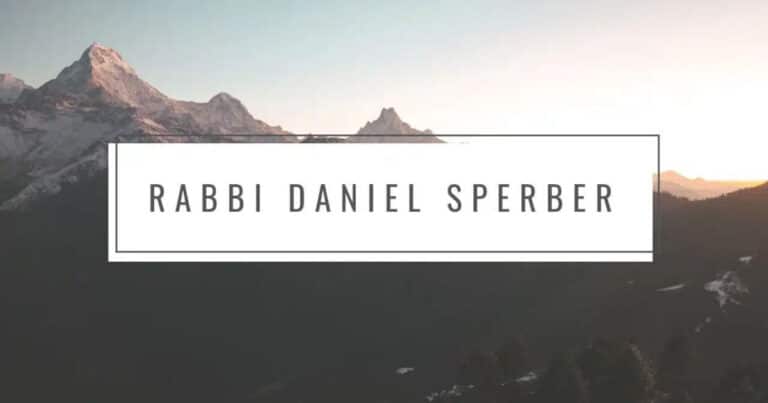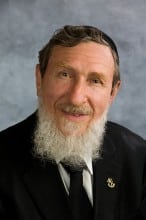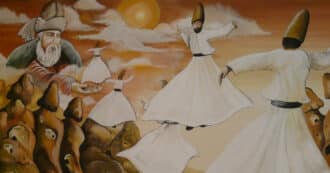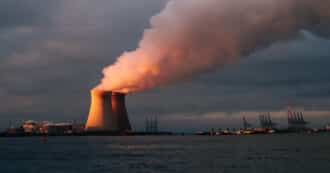Interviewed by Siiri Bigalke of The Interfaith Center for Sustainable Development and Recorded by Daniel Altman
The text below is the full transcription of the interview – a condensed version appears in the video above.
Transcription of the Interview with Rabbi Daniel Sperber
Siiri: Could you point to some exact examples of how sustainability and environmental ethics fit into Jewish principles and values?
Rabbi Sperber: In Jewish religious terms, when you look at the book of Genesis, you hear first of a place which is a Garden of Eden, where everybody lives in comfort; where you eat from the fruits of the trees, where you don’t eat animals. I’m a vegetarian for over 60 years. [In the Garden of Eden] there is basically no tension, where every element of nature is in harmony. And then it is destroyed and we find the “fall” as it is called. And the fall continues and becomes ever more destructive when we reach the story of the flood. And the flood was basically an example of the neck of disaster.
Jewish thought and Jewish law are very clear on the subject that you have to guard the whole of nature as a composite unit. If you see a tree that is sick, according to one of our basic sources, you paint a red line around it so that people should pray for it. You have to be kind to animals, you don’t slaughter an animal mother and its offspring at the same time, you don’t take eggs from a bird’s nest while the mother is there, and so on and so forth. The Sabbatical year is a year when the soil reinvigorates itself every seventh year, and when people are given a certain degree of equality in the sense that there is no personal property – any person has the right to go into a field and pick whatever is available to them. And ultimately it is a way of expressing in practical and pragmatic terms that the land that you live on, the earth, is not yours but God’s. God is the owner; we do not have actual ownership, we only have custodianship and hence of this we are reminded every seventh year when we cease to have ownership over what we thought was our own arable land.
Jewish law afterwards has a very developed series of principles on what is called “bal tashchit,” that you shouldn’t destroy things even when going to war, which is now a contemporary issue. We are not allowed to destroy fruit trees because one has to take into account that after the war people have to live and reap benefits from the fruit of the trees. Obviously you’re allowed to benefit from nature, but you must not destroy nature; you must preserve it.
Siiri: What do you see as the role of people of faith coming together to promote sustainability?
Rabbi Sperber: I think all of the major monotheistic religions will agree upon the fact that we are not masters and owners of the earth, we are just placed here as custodians. And that our position in the world, the reason that we were put here, is not damage but to remediate things. I think this is something that is very broadly accepted.
One of the most unifying elements – and it doesn’t matter if you’re a Jew, or a Christian, or a Buddhist or a Hindu – is when you see what’s happening to what used to be fresh water and other basic resources, and how they have been completely contaminated and polluted by industries that we are completely irresponsible. And we see how the rainforests in the Amazon have been decimated, and the effect on global warming etc. The peoples of all these different areas, notwithstanding their religious positions, understand that something has to be done about this. Everybody wants access to fresh water. With no fresh water, disease becomes rampant.
And there are religions that understand that trees and forests are places of holiness.
Siiri: Can you verbalize for us how you see faith, spirituality, and principles of ethical behavior help humanity live in balance with the natural world?
Rabbi Sperber: What I have found is that interfaith dialogue can create very strong personal relationships which can overcome religious differences. And if you find dialogue partners in positions of authority, then your dialogue, whether it be a religious dialogue, an interfaith dialogue, or one which is also coupled with other elements such as the economy and conservation, then you may be able to have some sort of affect. And when we talk about ecology, there is another element to it and that’s what we call socially responsible investment. The major damage and harm that is being done to nature is being done by massive international financial organizations. Whether they’re the oil people, aircraft industry or whatever, they’re just polluting and harming the ecostructure. Religious organizations, have massive investments, and can use those investments to curb the injurious effects of these organisations.
Siiri: Given your experience and wisdom as a leader in the Jewish community, what knowledge and character traits are most critical to bestow on our children’s generation to promote a sustainable future?
Rabbi Sperber: They need to understand that their personal comfort should not come at the expense of others.
This Conversation on Faith and Ecology was produced by the Interfaith Center for Sustainable Development (ICSD). Each conversation involves an interview with a religious figure on their perspective on their religion’s approach to ecological sustainability.
The aim of the initiative is twofold: firstly, to record the spiritual insight of religious and community leaders regarding sustainability, and secondly to ignite interfaith discussions regarding the nexus between spirituality and sustainability.






